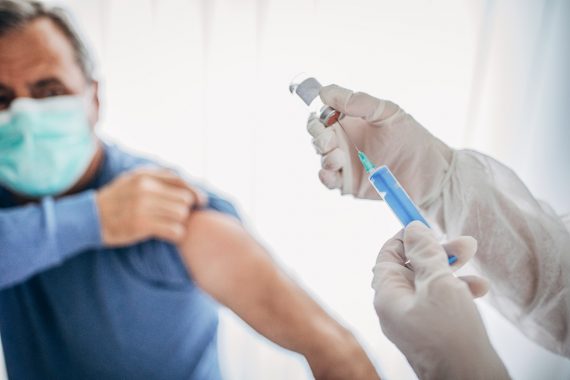A third dose of the Pfizer/BioNTech Covid vaccine has been found to ‘neutralise’ the Omicron variant in preliminary laboratory studies.
Pfizer/BioNTech today said that the early studies demonstrate that serum antibodies induced by their Covid vaccine ‘neutralise the SARS-CoV-2 Omicron variant after three doses’.
To evaluate their vaccine’s effectiveness against the Omicron variant, Pfizer and BioNTech tested a panel of human immune sera from the blood of individuals that received two or three 30-µg doses of the current Pfizer/BioNTech Covid vaccine.
The sera were collected from subjects three weeks after receiving the second dose or one month after receiving the third and tested for their neutralising antibody titer against the wild-type SARS-Cov-2 spike protein and the Omicron spike variant.
A statement said: ‘Preliminary laboratory studies demonstrate that three doses of the Pfizer/BioNTech Covid-19 vaccine neutralise the Omicron variant (B.1.1.529 lineage) while two doses show significantly reduced neutralization titers.’
It added: ‘According to the companies’ preliminary data, a third dose provides a similar level of neutralising antibodies to Omicron as is observed after two doses against wild-type and other variants that emerged before Omicron.
‘These antibody levels are associated with high efficacy against both the wild-type virus and these variants.’
The data also indicate that a third dose ‘increases the neutralising antibody titers by 25-fold compared to two doses against the Omicron variant’, it said.
Meanwhile, those who received two doses of the current vaccine exhibited ‘on average more than a 25-fold reduction in neutralisation titers against the Omicron variant compared to wild-type’, indicating that two doses ‘may not be sufficient to protect against infection with the Omicron variant’, it said.
However, since the ‘vast majority of epitopes targeted by vaccine-induced T cells are not affected by the mutations in Omicron, the companies believe that vaccinated individuals may still be protected against severe forms of the disease and are closely monitoring real-world effectiveness against Omicron globally’, it added.
The companies ‘will continue to collect more laboratory data and evaluate real-world effectiveness to assess and confirm protection against Omicron and inform the most effective path forward’, the statement said.
And they are continuing to work on the development of a variant-specific vaccine for Omicron and ‘expect to have it available by March in the event that an adaption is needed to further increase the level and duration of protection’, it added.
It said: ‘Pfizer and BioNTech have tested other variant-specific vaccines as well, which have produced very strong neutralisation titres and a tolerable safety profile.’
Data from clinical trials of variant-specific vaccines for Alpha, Beta, Delta and Alpha/Delta mix will be submitted to regulatory agencies to ‘help accelerate the process of adapting the vaccine and gaining regulatory authorisation or approval of an Omicron-specific vaccine, if needed’, it added.
There is ‘no change expected’ to the companies’ four billion dose capacity for 2022 if an adapted vaccine is needed, it said.
Pfizer chairman and chief executive Albert Bourla said: ‘Although two doses of the vaccine may still offer protection against severe disease caused by the Omicron strain, it’s clear from these preliminary data that protection is improved with a third dose of our vaccine.
‘Ensuring as many people as possible are fully vaccinated with the first two-dose series and a booster remains the best course of action to prevent the spread of Covid-19.’
BioNTech managing director, CEO and co-founder Ugur Sahin added that the preliminary dataset indicates a third dose ‘could still offer a sufficient level of protection from disease of any severity caused by the Omicron variant’.
It comes as NHS England has today set out the details of the temporary contract change aimed at freeing up GPs for Covid boosters.
NHS England announced that people aged over 40 and in high-risk groups are being invited to book their Covid booster jabs three months after their second dose from today.
Meanwhile, the Government announced last week that it has secured 114 million additional Covid vaccine doses for next year and 2023, including 54 million of the Pfizer jab.
Click to complete relevant Covid-19 CPD modules on Pulse Learning.
Pulse July survey
Take our July 2025 survey to potentially win £1.000 worth of tokens












